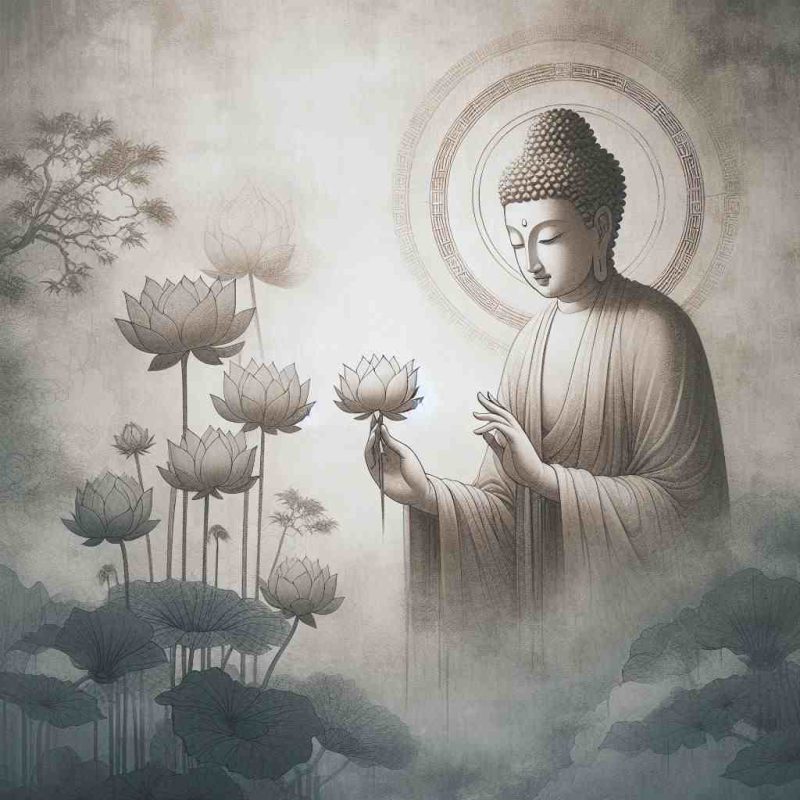The reason we practice dharma is to attain the purified state of Buddhahood and, if we do not achieve this state during our present lifetime, we should continue to pursue this aim throughout all future lifetimes until it is reached. If we practice as much as possi-ble in this life, we shall acquire a certain power or positive energy which will carry over to the next life in the practice, the force of both lives will combine to affect the life after that.
This cu-mulative process is like the life of a fruit tree- in its first year of growth it is small and yields nothing; only after several years of careful at- tention does it mature and bear fruit.
Therefore, to be able to benefit others we must realize that to be born as a human being endowed with the eighteen unique conditions is a very precious opportunity. With a human birth, we have a chance to practice dharma, which we could not do if we were born an animal. Moreover, such a favorable birth is not a mere coincidence but the result of specific causes: the abandoning of unskillful actions and the accumulation of skillful ones.
We receive only the fruit of those actions that we our-selves have created. If we act carelessly, following the im-pulses of emotional afflictions such as greed, aggression, arrogance and so forth, we shall only produce results opposite to our wishes. The results of careless actions will eliminate any chance we may have of finding circumstances conducive to spiritual practice in the future.

Understanding our actions (karma) is a pro- found and vast subject containing many aspects. In general, actions are produced through the three doors of our body, speech and mind. In order to avoid suffering and confu- sion in the future and to acquire a precious hu- man form again, we must cease creating any more unwholesome actions; specifically we should stop what are called the ‘ten non-virtu- ous actions.’ Instead we should constantly act with skillful awareness, for this will help in the achievement of the happiness we desire.
To take advantage of the freedoms and en-dowments of a precious human form we should adopt as the foundation of our life the abandonment of the ten non-virtuous actions. Abandoning the ten non-virtuous actions naturally cor-responds with the practice of the ten virtuous ones. There are three unskillful actions of the body: killing any sentient being. taking that which is not given, and engaging in sexual misconduct. There are four of speeches: lying, slander-ing or creating division between people, speaking harshly by scolding, swearing or being sarcastic, and foolishly cha-tering or engaging in senseless conversation. There are three unwholesome actions of the mind: greed, hatred or ill-will toward others, and holding on to such wrong views as dis-belief in the law of cause and effect or in the attainment of the fully awakened state of Buddhahood.
When we understand that committing these ten un-wholesome deeds causes the most harm and the deepest suf-fer- ing to ourselves as well as to others, we come to think of them as our most dangerous enemy. If any impulse arises to commit even one of them, we should quickly analyze the deceptive nature and detrimental results of such an im- pulse. In this way we shall be able to prevent ourselves from com-mitting the action, and eventually stop the impulse from arising. The successful abandonment of these becomes the practice of the ten virtuous deeds, and this in itself accumu-lates much positive merit.
We should regard the desire to commit any of the ten un-wholesome deeds as more harmful than a poisonous snake coiled in our lap. If a snake were to bite us. the worst it could do would be to cause pain. illness and possibly death; it does not have the power to propel our consciousness at death into an unfavorable birth. Committing any of the non-virtuous deeds, however insignificant it might appear, does have such power. There- fore, accumulating instincts for committing any unskillful actions has consequences more dire than any bite by a venomous snake.

